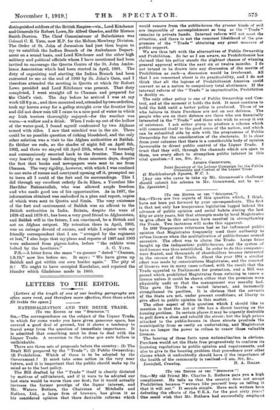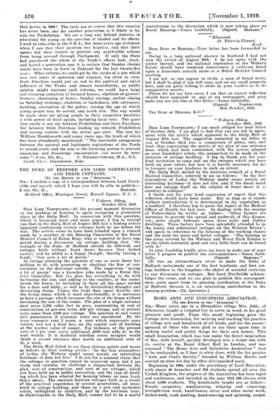[To THE EDITOR OF THE " Sezorszoa.") Sus,—My old friend
Mr. Charles L. Bothers pays you a high compliment. He tells us that the country does not accept Prohibition because "writers like yourself keep on telling it that it will not." It sounds simple. Have such writers been defeating the efforts of the U.K.A. for the past sixty years? One could wish that Mr. Rothera had successfully employed
that device in 1904! The facts are of course that this country has never been, nor for another generation is it likely to be, ripe for Prohibition. We are a long way behind America in educating the young on the question of alcohol and its effects. I used Co subscribe to the U.K.A., but some years ago withdrew when I saw that their position was hopeless. and that their agents did their utmost to prevent any practicable scheme from being pressed through Parliament. If only the State had purchased the whole of the Trade's effects lock, stock, and barrel a generation ago, it is certain that Sunday closing would have been in force in England for the last twenty-five years. What reforms we could get by the stroke of a pen which now cost years of agitation and expense, too often in vain. State Purchase would put an end to the political and socill influence of the Trade, and almost immediately, as public opinion might warrant such reforms, we could have large :nl sweeping reduction of licensed houses; abolition of grocers' licences; shortening of hours; Sunday closing; earlier closing on Saturday evenings; abolition of back-doors, side entrances, hawking, corruption of the police; raising the age at which young people may be served, and much else. The way would be made clear for giving people in their respective localities a wide power of local option, including local veto. The question surely is not one between Prohibition and State Purchase, but between State Purchase leading up towards Prohibition and resting content with the status quo ante. The late Sir William Hauldsworth said many years ago, the truth of which has been abundantly manifested: " The inevitable antagonism between the natural and legitimate aspirations of the Trade to extend itself, and the aim of the licensing system to prevent expansion and discourage consumption, can never be over
come."—I aDI, Sir, &c., L. STILEMAN-GIBPARD, M.A., D.L. Castle Close, Sharnbrook, Beds.







































 Previous page
Previous page